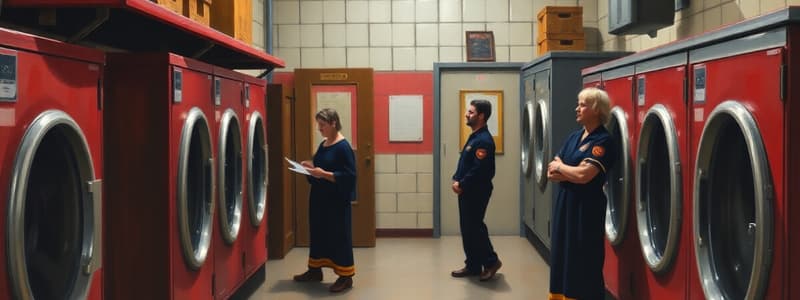Podcast
Questions and Answers
According to the Standard Operating Procedure (SOP) 919, what should be done with grossly contaminated uniforms?
According to the Standard Operating Procedure (SOP) 919, what should be done with grossly contaminated uniforms?
- They should be placed in a single yellow plastic bag marked with the wearer's name, shift and station and brought to the Logistics Division.
- They should be washed in the station's laundry facilities along with other slightly contaminated uniforms.
- They should be thrown away in a biohazard red bag.
- They should be placed in a doubled yellow plastic bag marked with the wearer's name, shift and station and brought to the Logistics Division. (correct)
What is the correct procedure for washing slightly contaminated and soiled station uniforms?
What is the correct procedure for washing slightly contaminated and soiled station uniforms?
- Wash, rinse twice, then run an empty cleaning cycle.
- Wash and rinse twice. (correct)
- Wash and rinse once.
- Wash, rinse once, then run an empty cleaning cycle.
According to the SOP 919, where should ordinary wear clothes and linens be washed?
According to the SOP 919, where should ordinary wear clothes and linens be washed?
- In the station's laundry facilities, along with slightly contaminated uniforms.
- At the wearer's home.
- In the station's laundry facilities after an empty cleaning cycle has been run. (correct)
- At a specialized laundry facility that follows N.F.P.A. guidelines.
When should the Logistics Division be contacted regarding contaminated uniforms?
When should the Logistics Division be contacted regarding contaminated uniforms?
What type of clothing is explicitly NOT permitted in the offices or break area of the Logisitics Division?
What type of clothing is explicitly NOT permitted in the offices or break area of the Logisitics Division?
What types of garments can be laundered in the department clothes washers?
What types of garments can be laundered in the department clothes washers?
How often does each station receive detergent for laundering dish towels?
How often does each station receive detergent for laundering dish towels?
What should individuals use to wash their personal items?
What should individuals use to wash their personal items?
What type of contamination is described as exposure to a biological terrorist agent?
What type of contamination is described as exposure to a biological terrorist agent?
Which of the following is NOT allowed to be washed in the department clothes washers?
Which of the following is NOT allowed to be washed in the department clothes washers?
What is the role of bleach in the washing process according to the guidelines?
What is the role of bleach in the washing process according to the guidelines?
What should be done with personal protective ensembles concerning cleaning?
What should be done with personal protective ensembles concerning cleaning?
What frequency does the department provide bottles of bleach to each station?
What frequency does the department provide bottles of bleach to each station?
Flashcards
Washing contaminated uniforms
Washing contaminated uniforms
Slightly contaminated uniforms should be washed and double rinsed before other laundry.
Cleaning cycle for uniforms
Cleaning cycle for uniforms
Run a full empty cycle after washing soiled uniforms, before washing regular clothes.
Handling grossly contaminated uniforms
Handling grossly contaminated uniforms
Place in doubled yellow bags with your info, not in biohazard bags.
Laundering protocols
Laundering protocols
Signup and view all the flashcards
Haz-Mat cleaning procedures
Haz-Mat cleaning procedures
Signup and view all the flashcards
Garment
Garment
Signup and view all the flashcards
Grossly Contaminated
Grossly Contaminated
Signup and view all the flashcards
Slightly Contaminated
Slightly Contaminated
Signup and view all the flashcards
Soiled
Soiled
Signup and view all the flashcards
Ordinary Wear
Ordinary Wear
Signup and view all the flashcards
Laundry Supplies
Laundry Supplies
Signup and view all the flashcards
Cleaning Procedures
Cleaning Procedures
Signup and view all the flashcards
Personal Protective Equipment (PPE)
Personal Protective Equipment (PPE)
Signup and view all the flashcards
Study Notes
Standard Operating Procedure (SOP) 919: Fire Station Clothes Washers and Dryers
- Subject: Fire Station Clothes Washers and Dryers
- Category: Operations/Support Services
- Subcategory: Logistics
- Effective Date: 10/08/13
- Revision Date: 08/12/20
- Purpose: To provide guidelines for the use of clothes washers and dryers at fire stations.
Definitions
- Garment: Station uniforms or personal protective ensembles.
- Grossly Contaminated: Soiled with large amounts of blood or body fluids, exposure to hazardous materials, or biological agents.
- Slightly Contaminated: Soiled with small amounts of blood or body fluids.
- Soiled: Exposed to heat, elements, and products of combustion.
- Ordinary Wear: Normal daily use.
Facilities
- Every fire station is equipped with a clothes washer and dryer.
- Laundry products (detergent, bleach) for dishtowels are provided.
- Individual station members purchase personal laundry products using their yearly allowance.
Cleaning Procedures
- Only slightly contaminated, soiled, or ordinary-wear garments and bedding are placed in washers/dryers.
- Personal Protective Equipment (PPE) is not put in the washers/dryers. (Refer to SOP 605 for PPE cleaning).
- Oily rags, shop towels, etc. are not washed.
- Slightly contaminated/soiled uniforms are washed twice and rinsed.
Biohazard Cleaning
- Grossly contaminated uniforms/PPE are placed in double yellow plastic bags marked with personnel information (name, shift, station) and taken to the Logistics Division.
- Do not use biohazard red bags.
- The Logistics Division will handle the laundering and notify staff when uniforms are ready.
- Protective gloves are recommended for this procedure.
- Personnel must maintain cleanliness/hygiene after handling contaminated uniforms.
- If necessary after hours, contact the on-duty District Commander.
- Contaminated items are not permitted in office or break areas.
Haz-Mat Cleaning (Hazardous Materials)
- Cleaning of Haz-Mat contaminated clothing is done on a case-by-case basis and in consultation with the Pinellas County Hazardous Materials Team.
Laundering Requirements
- Run a full cleaning cycle after washing slightly contaminated garments before washing ordinary clothes/linens.
- Ordinary clothing/linens require only washing and a single rinse.
- Contaminated or soiled uniforms should not be taken away from the work location outside for laundering.
Studying That Suits You
Use AI to generate personalized quizzes and flashcards to suit your learning preferences.




